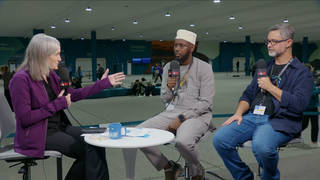
Topics
Over 120,000 are gearing up for the 2005 World Social Forum which opened in the southern Brazilian city of Porto Alegre. We go to Brazil to speak with Njoki Njoroge Njehu of the 50 Years is Enough network. [includes rush transcript]
The fifth World Social Forum has opened in the southern Brazilian city of Porto Alegre. Over 120,000 participants are gearing up for five days of conferences workshops and panel discussions tackling a vast spectrum of issues ranging from environmental conservation to reparations for victims of Latin America’s right-wing dictatorships to the war in Iraq.
Brazilian President Luiz Inacio Lula da Silva spoke at a mass rally to launch an initiative by the Global Call to Action Against Poverty. Calling it a matter of international security, Lula called on poor countries to put pressure on rich nations to eradicate global poverty, reduce foreign debt and establish fair trade agreements. He said, “The rich must understand that we will never have a peaceful world unless we tackle poverty.”
The World Social Forum was created specifically as a counterweight to the World Economic Forum in Davos, Switzerland.
- Njoki Njoroge Njehu, 50 Years is Enough. She joins us on the line from Porto Alegre.
Transcript
AMY GOODMAN: We are joined on the phone from Porto Alegre by Njoki Njehu. She is the head of 50 Years is Enough network. Welcome to Democracy Now!
NJOKI NJOROGE NJEHU: Thank you, Juan. Thank you, Amy.
AMY GOODMAN: Njoki, can you tell us about the latest news about proposals for debt reduction and also just the whole scene at the World Social Forum right now?
NJOKI NJOROGE NJEHU: Well, the World Social Forum is always an inspiration for anyone who participates, and I feel very privileged to be here. There are tens of thousands of people who are participating in activities here. We have a youth camp that has about 30,000 youth from around the world. And the issue of international debt is very much on the table, especially for the countries affected by the tsunami. It’s been just about a month since the tsunami hit, and what is tragic is that even though the peoples of the world have responded with tremendous generosity, giving — you hear of children giving away their allowances and holding bake sales and the rest to help tsunami victims, the world’s richest institutions and governments have not responded in kind. The proposal that is on the table right now is that they would do a moratorium on debt, which means that countries would not be obliged to pay for now, but as soon as they start recovering, instead of extending their recovery and moving beyond that, they’re going to have to start paying debts that are accruing by the World Bank and by the I.M.F. and by rich creditors. Debts reach many, many debt [inaudible] that hold to be legitimate, to be odious, to already have been pay. And so this is one of the issues on the table.
JUAN GONZALEZ: Well, can you talk a little bit in terms of who the proposal is coming from and what countries it would affect? Because here in the United States, about the only news we’re getting on the World Social Forum is that when Lula spoke, The New York Times has an article today, that he was booed by a significant minority of the participants, very little about the actual issues that are being raised there.
NJOKI NJOROGE NJEHU: Well, I mean, The New York Times and mainstream media continue to distinguish themselves by kind of missing the boat all the time on important things that are happening, especially with social movements. I think that there were — it was in this huge stadium — there were tons of people there, many of them who had very big pro-Lula banners and some of them who, you know, who are not very happy with Lula here in Brazil. But that was not the point. It was not a political rally for the party or anything like that. It was a rally to launch the global call against poverty, and what Lula has done, and I think that what many leaders are realizing time and time again is that they get elected under great expectations from their people. President Lula has said that he wants to lead Brazil where everyone is assured of three meals a day. In some ways, a very ambitious plan. In some other ways, not a very ambitious plan, and some people think that he is not doing enough. But what is really important is that on the platform with President Lula, people from all over the world, and here they’re not talking about U.N. proposals or other things, they’re talking about the initiatives and the strategies and innovations that people around the world are engaging in in the fight against poverty, and it is a whole range of issues from water — I mean, The New York Times perhaps could have written about the referendum in Uruguay where Uruguay has decided that water is a human right, not a need, and it’s guaranteed to everyone. And Argentina is looking at the same kind of thing, so there are a lot of wonderful stories to be told here. Interesting stories, colorful stories of music and resistance and dance and creativity. But they are missing it. But then again, I’m not surprised.
AMY GOODMAN: Njoki Njehu, I want to thank you for being with us from Porto Alegre. We’ll continue to cover the World Social Forum next week. Njoki Njehu, a 50 Years is Enough network, Kenyan environmentalist and activist.













Media Options